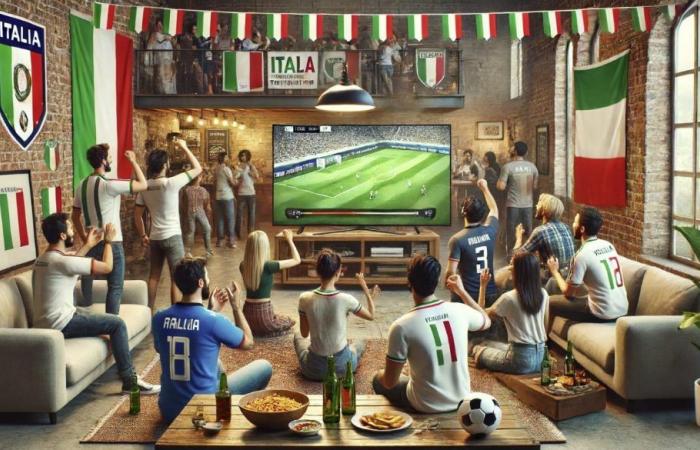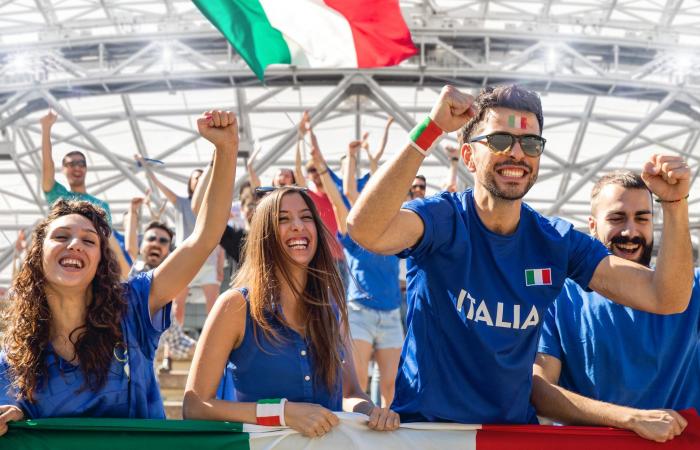Watching the national team at the European Championships or the World Cup seems to be a question that overcomes the passion for football. There are many reasonsincluding some of character evolutionary And neuroscientificwhich science can formulate for explain this behavior: our tendency to conformthe interest in the extraordinary nature of the eventthe storytelling epic of the media. All elements that attract our brain, which make us emotionally activate to feel part of our group.
The national team creates a sense of unity and solidarity
It all depends on social nature of Homo sapienswhich he found in the group life an effective way to survive and reproduce. The social life of us humans, as for many other social species, has taken on a group structure, within which there is a climate of collaborationwhile at the same time promoting a form of competition with external groups.
In this sense, cheering for the teams national football teams is configured as membership to one of the most important groups that our societies have built over time, and its popularity depends precisely on the fact that the national football team overlaps with one of the main groups in which we live, our Stateput to the test in a competitive playground with other states.
If for them club teams of Serie A this type of aggregation is very more fragmentary (it is not unusual for a city or a region to have two or more clubs, such as Roma and Lazio, Milan and Inter or Juventus and Turin), the vast majority of the population has no obstacles in identifying with the Italian national team.
Regardless of whether you are a football fan or not, Supporting the national team creates a sense of unity and solidarity. During international tournaments, such as the World Cup or the European Championships, people find themselves at share a collective identitywhich strengthens the social and national bond, not to mention that all this becomes an easy pretext for meet up with friends and feel united.
What happens in the brain
On the floor cognitive And neuroscientific the short duration of the event, the considerable distance between the editions of the tournament and its group configuration play a fundamental role.
- There brevity of the event impacts on our way of perceiving it as new, rare, and this captures more interest compared to repetitive events, such as the Serie A championship which is played every year;
- The notable one distance between one European and anotheras well as for the World Cup, increases the perception of extraordinaryness and the load of expectations associated with it: research shows that rare events can lead to greater dopaminergic activation In the nucleus accumbens and in the bark prefrontalsuggesting that the brain attributes a highest value to experiences that occur sporadically, as events held once every four years. It also follows a emotional load particularly high due to the sensation of experiencing something uncommon, and this reverberates in our memory system with the so-called “von Restorff effect”, according to which unique or distinctive events are remembered better than common ones;
- There group structure and ad direct elimination creates the right mix between commitment and epic nature “play it all”which provides a significant dose of catecholamines intoxicating to our synapses.

The celebratory environment around us and the narrative of the football feat
Furthermore, during the tournament, there are quite a few environmental stimuli which, even beyond our control, take us back to the football event: giant screens in the squares, televisions outside the venues and extraordinary media attention, not to mention the advertisements in which the national team is involved.
Everyone ingredients that fuel and envelop us in a narrative and, as we know, our brain goes crazy for narratives, even more so if they see us protagonists together with our ingroup members and in competition with outgroup members. Telling stories seems to be the prerogative of human beings, so much so that John Niles suggests changing the name of our species to “Homo narrans“.
The narratives they create culture and they bring people together in businesses: studies show that involvement in stories increases empathy and the ability to understand the beliefs and desires of others, with overlap between the areas of the brain which are activated while we read a narrative text and the areas of social cognition.






